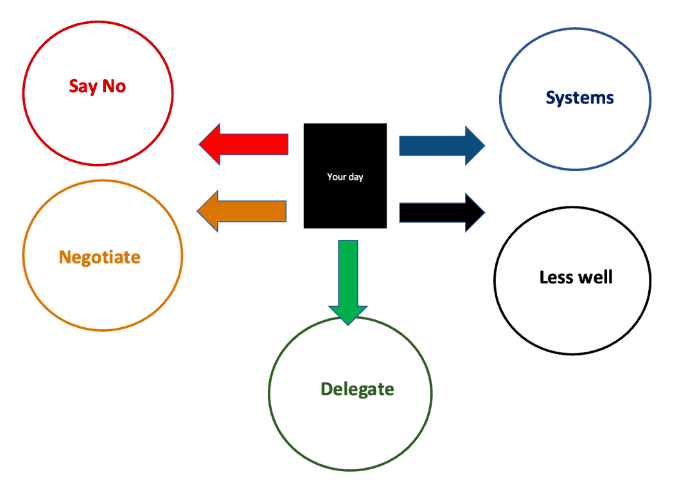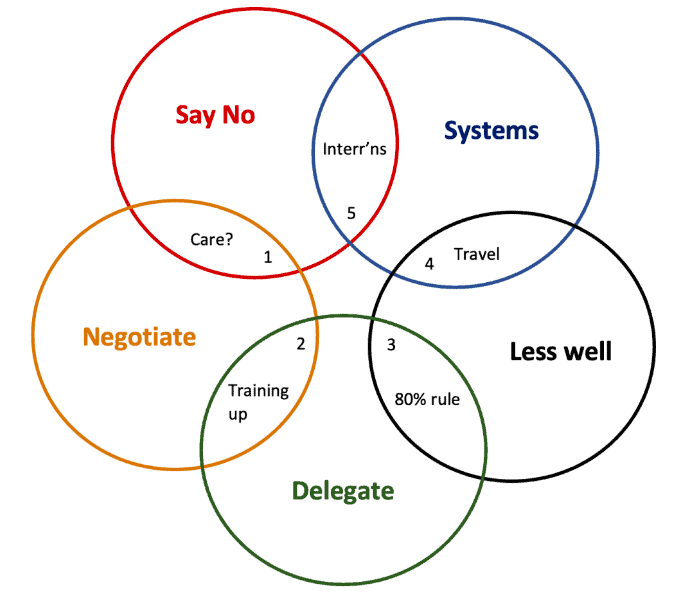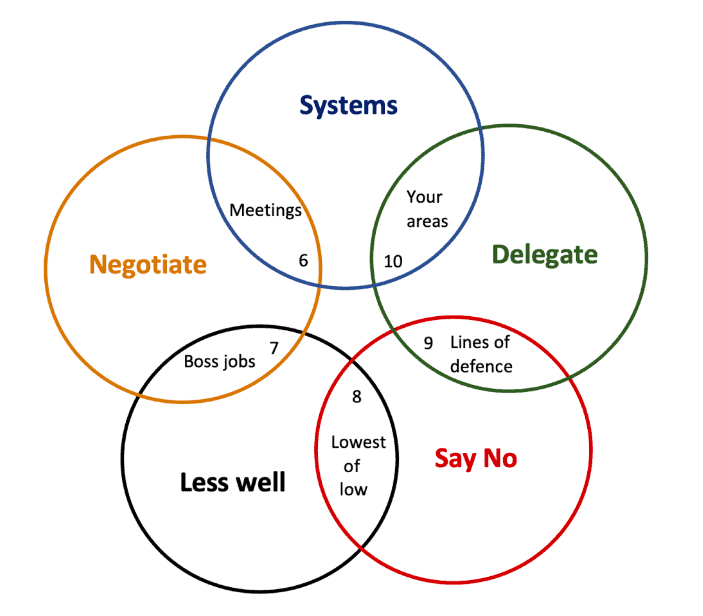There are five main ways…

…but if you look at overlaps between these five you get another ten:


We already know about the five options for getting more done—two are about letting less work in (say no or negotiate, which is a partial no); delegation is about letting it in but not doing it yourself, and two are about getting more done yourself—better systems, and being less of a perfectionist (which I call, slightly controversially to make the point, “doing it less well”). Many times, management ideas fall into these five things, for example jobs to do lists are a system, and knowing your best time of day is a system.
But it’s worried me for a while now that some things fall into the overlaps, for example having a way to deal with interruptions is a system for saying no, and using Zoom instead of going to see a customer is a system which involves doing something less well (but a lot quicker!). Multitasking is a not-recommended system which leads to doing things less well (and more slowly in the end too!). Procrastination is a substitute for saying no, and needs a system (e.g. breaking things into chunks or putting them in our diaries) to overcome it.
So I thought about the overlaps…
And then an article about the circle of fifths (it’s a music thing) gave me the idea of how TWO diagrams of the five circles could show us ALL of the possible overlaps—there are ten.
1. There will be things you’d like to say no to, but because you care about the relationship you have to at least do SOME of. So a shorter visit to your in-laws, emailing some basic instructions to a customer, helping a computer-illiterate friend once but they have to write notes so that next time they can do it themselves—you would be rude to just say no to this kind of thing, but it’s not high on your priorities to it’s okay to negotiate over how much time they get.
2. Training up a member of your team so that you can delegate to them in the future. Getting them to do part of a job, and then most of it, until they reach the point where they can do all of it. Coaching until you can delegate. Whose job is it? Well, it’s in the overlap, and you’re the boss so you can say it’s theirs.
3. If they will do it less well than you, but only slightly less well—give it to them. This is the only way they can learn. They will go from 80% as good as you to 90, 100, and maybe even 120% as good as you. So it’s only a temporary price, after which we have TWO people who can do the job at 100%, and you are freed up to do even bigger tasks, or to leave, or go on holiday, or get promoted. If you wait for them to reach 100% before you delegate you’ll have to wait for ever. But of course if they are only at 30% you have to coach them rather than delegate.
4. Using Zoom instead of going to see someone is an example of using systems which mean a saving of time, but the job is done less well. Avoiding travel by Zoom is often like this. But it’s done well enough. Especially if you visit them half the time and use Zoom the other half. Other examples might be to offer customers AI rather than a person. Although who knows, AI might be quicker and more accurate than a person, as well as saving you time and both you and the customer money.
5. Interruptions need a system for saying no—whether it’s a sign on your door, a signal you use like wearing a red hat or putting on headphones, rules about which times of day you are available and when you’re not, and even a carefully worded way to say that you can’t be interrupted at the moment, these are all systems for saying no. This last example could apply to more than interruptions—a form of words to say no. l’ve been working on a standard wording for my PA to use to turn away high maintenance questions and requests for 1:1 coaching which I get via LinkedIn messaging many times a day!

6. Meetings are mixture of a negotiation and an (often bad) system—the game is to only come to part of it, get the meeting done in the shortest time, have the meeting less often, influence what’s on the menu, not have too many people there, stop people rambling and keep them to the point, and get actions agreed; and all this when you‘re probably not chairing the meeting, so it’s all about influencing the others, negotiating, to get the system to be as efficient as you can get it.
7. Job for your boss (or for the organisation’s systems) have to be done—e.g. your weekly time sheet, the monthly budget or sales forecast, the project progress report, etc. Saying no to them isn’t an option. But can you negotiate to do them less well? And remember this doesn’t mean full of mistakes, it means doing them well enough so they are fit for purpose without any unnecessary perfection and detail creeping in. But you have to agree this with your boss rather than just hoping they don’t notice, because every now and then they WILL!
8. The worst jobs of all, the ones that are pointless and bottom of your list, should really be candidates for saying no to, but sometimes they just can’t be avoided, so doing them less well is your fall-back. Can you do the absolute minimum so that at least you can’t be accused of not doing them at all?
9. When you’re busy (you always are!) your first line of defence should be, “Can I say no to this?” and if not then the second is “Okay, it has to be done, who can I give it to?” You have failed if you have to do it yourself! Because everything should be delegate-able. If you can’t delegate it now then who can you train up to do it next time? So the only question is whether to say no to it, (the harder option for you), to save your team the work when you let it in and give it to them. You are the guardian of their workload.
10. Your systems should be set up so that everything can be delegated. There should be nothing that falls between the cracks so that it is only owned by you. Your job is to make sure everything is owned by someone (and only one person, not shared) and that everyone knows what is theirs, so that when a job comes in you don’t have to make a decision, or tell people whose it is—they just know. A system for delegating everything.
